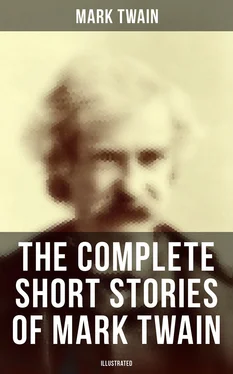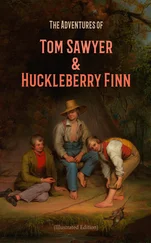Young Stillman stepped outside, held the light to the ground, turned leftward, and moved three steps, closely examining; then said, "I've got the direction—come along; take the lantern, somebody."
He strode off swiftly southward, the files following, swaying and bending in and out with the deep curves of the gorge. Thus a mile, and the mouth of the gorge was reached; before them stretched the sagebrush plain, dim, vast, and vague. Stillman called a halt, saying, "We mustn't start wrong, now; we must take the direction again."
He took a lantern and examined the ground for a matter of twenty yards; then said, "Come on; it's all right," and gave up the lantern. In and out among the sage-bushes he marched, a quarter of a mile, bearing gradually to the right; then took a new direction and made another great semicircle; then changed again and moved due west nearly half a mile—and stopped.
"She gave it up, here, poor little chap. Hold the lantern. You can see where she sat."
But this was in a slick alkali flat which was surfaced like steel, and no person in the party was quite hardy enough to claim an eyesight that could detect the track of a cushion on a veneer like that. The bereaved mother fell upon her knees and kissed the spot, lamenting.
"But where is she, then?" some one said. "She didn't stay here. We can see that much, anyway."
Stillman moved about in a circle around the place, with the lantern, pretending to hunt for tracks.
"Well!" he said presently, in an annoyed tone, "I don't understand it." He examined again. "No use. She was here—that's certain; she never walked away from here—and that's certain. It's a puzzle; I can't make it out."
The mother lost heart then.
"Oh, my God! oh, blessed Virgin! some flying beast has got her. I'll never see her again!"
"Ah, don't give up," said Archy. "We'll find her—don't give up."
"God bless you for the words, Archy Stillman!" and she seized his hand and kissed it fervently.
Peterson, the new-comer, whispered satirically in Ferguson's ear:
"Wonderful performance to find this place, wasn't it? Hardly worth while to come so far, though; any other supposititious place would have answered just as well—hey?"
Ferguson was not pleased with the innuendo. He said, with some warmth,
"Do you mean to insinuate that the child hasn't been here? I tell you the child has been here! Now if you want to get yourself into as tidy a little fuss as—"
"All right!" sang out Stillman. "Come, everybody, and look at this! It was right under our noses all the time, and we didn't see it."
There was a general plunge for the ground at the place where the child was alleged to have rested, and many eyes tried hard and hopefully to see the thing that Archy's finger was resting upon. There was a pause, then a several-barrelled sigh of disappointment. Pat Riley and Ham Sandwich said, in the one breath,
"What is it, Archy? There's nothing here."
"Nothing? Do you call that nothing?" and he swiftly traced upon the ground a form with his finger. "There—don't you recognize it now? It's Injun Billy's track. He's got the child."
"God be praised!" from the mother.
"Take away the lantern. I've got the direction. Follow!"
He started on a run, racing in and out among the sage-bushes a matter of three hundred yards, and disappeared over a sand-wave; the others struggled after him, caught him up, and found him waiting. Ten steps away was a little wickieup, a dim and formless shelter of rags and old horse-blankets, a dull light showing through its chinks.
"You lead, Mrs. Hogan," said the lad. "It's your privilege to be first."
All followed the sprint she made for the wickieup, and saw, with her, the picture its interior afforded. Injun Billy was sitting on the ground; the child was asleep beside him. The mother hugged it with a wild embrace, which included Archy Stillman, the grateful tears running down her face, and in a choked and broken voice she poured out a golden stream of that wealth of worshiping endearments which has its home in full richness nowhere but in the Irish heart.
"I find her bymeby it is ten o'clock," Billy explained. "She 'sleep out yonder, ve'y tired—face wet, been cryin', 'spose; fetch her home, feed her, she heap much hungry—go 'sleep 'gin."
In her limitless gratitude the happy mother waived rank and hugged him too, calling him "the angel of God in disguise." And he probably was in disguise if he was that kind of an official. He was dressed for the character.
At half past one in the morning the procession burst into the village singing, "When Johnny Comes Marching Home," waving its lanterns, and swallowing the drinks that were brought out all along its course. It concentrated at the tavern, and made a night of what was left of the morning.
Table of Contents
Table of Contents
The next afternoon the village was electrified with an immense sensation. A grave and dignified foreigner of distinguished bearing and appearance had arrived at the tavern, and entered this formidable name upon the register:
SHERLOCK HOLMES.
The news buzzed from cabin to cabin, from claim to claim; tools were dropped, and the town swarmed toward the center of interest. A man passing out at the northern end of the village shouted it to Pat Riley, whose claim was the next one to Flint Buckner's. At that time Fetlock Jones seemed to turn sick. He muttered to himself,
"Uncle Sherlock! The mean luck of it!—that he should come just when...." He dropped into a reverie, and presently said to himself: "But what's the use of being afraid of him? Anybody that knows him the way I do knows he can't detect a crime except where he plans it all out beforehand and arranges the clues and hires some fellow to commit it according to instructions.... Now there ain't going to be any clues this time—so, what show has he got? None at all. No, sir; everything's ready. If I was to risk putting it off.... No, I won't run any risk like that. Flint Buckner goes out of this world to-night, for sure." Then another trouble presented itself. "Uncle Sherlock 'll be wanting to talk home matters with me this evening, and how am I going to get rid of him? for I've got to be at my cabin a minute or two about eight o'clock." This was an awkward matter, and cost him much thought. But he found a way to beat the difficulty. "We'll go for a walk, and I'll leave him in the road a minute, so that he won't see what it is I do: the best way to throw a detective off the track, anyway, is to have him along when you are preparing the thing. Yes, that's the safest—I'll take him with me."
Meantime the road in front of the tavern was blocked with villagers waiting and hoping for a glimpse of the great man. But he kept his room, and did not appear. None but Ferguson, Jake Parker the blacksmith, and Ham Sandwich had any luck. These enthusiastic admirers of the great scientific detective hired the tavern's detained-baggage lockup, which looked into the detective's room across a little alleyway ten or twelve feet wide, ambushed themselves in it, and cut some peep-holes in the window-blind. Mr. Holmes's blinds were down; but by-and-by he raised them. It gave the spies a hair-lifting but pleasurable thrill to find themselves face to face with the Extraordinary Man who had filled the world with the fame of his more than human ingenuities. There he sat—not a myth, not a shadow, but real, alive, compact of substance, and almost within touching distance with the hand.
"Look at that head!" said Ferguson, in an awed voice. "By gracious! that's a head!"
"You bet!" said the blacksmith, with deep reverence. "Look at his nose! look at his eyes! Intellect? Just a battery of it!"
"And that paleness," said Ham Sandwich. "Comes from thought—that's what it comes from. Hell! duffers like us don't know what real thought is."
Читать дальше












